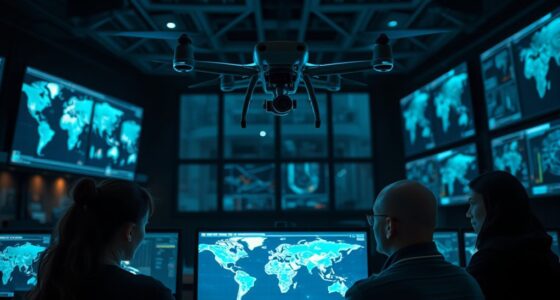Mossad’s use of machine intelligence often sparks rumors of advanced technology and cyber prowess. While the agency likely employs sophisticated tools for surveillance and analysis, much of the myth exaggerates its capabilities. Realistically, Mossad combines human expertise with evolving tech, not relying solely on AI. If you want to understand what’s fact and fiction behind these claims, there’s more to uncover about their true methods and limitations.

Mossad, Israel’s premier intelligence agency, has increasingly integrated machine intelligence to enhance its operations. You might have seen the headlines suggesting that artificial intelligence and advanced algorithms now play a crucial role in espionage activities, but the reality is more nuanced. While there’s truth to the fact that Mossad employs cutting-edge technology, it’s important to distinguish between hype and fact. Machine intelligence in intelligence work doesn’t mean replacing human agents but augmenting their capabilities to gather, analyze, and act on information more efficiently. You need to understand that these tools serve as force multipliers, helping agents process vast amounts of data that would be impossible to handle manually.
In practical terms, Mossad uses machine learning models to sift through intercepted communications, social media activity, and open-source intelligence. These systems can identify patterns and anomalies that might indicate threats or opportunities, significantly speeding up decision-making processes. For example, they might flag suspicious financial transactions or monitor shifts in geopolitical rhetoric online. But it’s crucial to recognize that these technologies are tools rather than autonomous decision-makers. Human analysts still interpret the data, validate findings, and determine the next steps. This collaboration between human intuition and machine efficiency is what makes the agency effective.
Contrary to popular myths, machine intelligence doesn’t mean that Mossad relies solely on algorithms or that it has developed sentient systems capable of independent thought. The agency’s use of technology is strategic and targeted, focusing on enhancing existing intelligence methods rather than replacing them. You might picture sci-fi scenarios of fully autonomous spies or robotic agents, but the reality is that the core of Mossad’s success remains rooted in human expertise, experience, and judgment. Machine intelligence acts as an assist, helping analysts identify leads faster and reducing the risks of oversight.
Furthermore, security concerns ensure that these systems are tightly controlled. Mossad invests heavily in cybersecurity and safeguards to prevent manipulation, hacking, or misuse of its machine intelligence networks. The agency’s focus remains on operational security, ensuring that these tools remain confidential and reliable. While the technology’s potential is vast, it’s clear that any claims suggesting total reliance on AI or autonomous agents are exaggerated. Instead, Mossad’s approach is a sophisticated blend of human skill and machine efficiency—each complementing the other to serve national security interests. This balance is what keeps the agency at the forefront of modern intelligence operations.
Frequently Asked Questions
How Does Mossad Integrate Artificial Intelligence Into Its Operations?
You see, Mossad integrates artificial intelligence into its operations by leveraging advanced algorithms to analyze vast data sets quickly. They use AI for intelligence gathering, facial recognition, and pattern detection, which helps identify threats faster. You might not notice it, but AI tools assist Mossad in decision-making and operational planning, making their work more efficient and precise. This integration enhances their capabilities without revealing the full extent of their technological edge.
What Ethical Concerns Surround Mossad’s Use of Machine Intelligence?
You should consider that ethical concerns around Mossad’s use of machine intelligence include privacy violations, potential bias in algorithms, and the risk of unintended harm. These tools can lead to surveillance overreach and decision-making that lacks transparency. You might worry about accountability and the moral implications of relying on AI for sensitive operations, emphasizing the need for strict oversight and clear ethical guidelines to prevent abuse or misuse.
Are There Publicly Known Failures of Mossad’s Machine-Based Intelligence?
Yes, there are publicly known failures of Mossad’s machine-based intelligence. You might recall instances where surveillance data led to incorrect assumptions or misidentifications, resulting in operational setbacks. These failures highlight that, despite advanced technology, human oversight remains critical. While some errors are kept secret, open reports acknowledge that machine intelligence isn’t infallible, reminding you that even the most sophisticated systems can stumble.
How Does Mossad’s Machine Intelligence Compare to Other Intelligence Agencies?
You might think Mossad’s machine intelligence is a cut above, and it’s fair to say they’re highly effective. While they don’t reveal all their methods, their technology rivals other top agencies, often integrating advanced cyber tools and data analysis. However, like any organization, they face challenges. Still, their innovative approach keeps them a formidable player, proving that sometimes, a mix of human skill and machine power wins the day.
What Future Developments Are Expected in Mossad’s Machine Intelligence Capabilities?
You can expect Mossad’s machine intelligence capabilities to advance rapidly, integrating more sophisticated AI and data analytics. They’ll likely develop better pattern recognition, real-time data processing, and automation to enhance intelligence gathering. As technology evolves, Mossad will probably focus on cyber intelligence, machine learning, and autonomous systems, making their operations more efficient and precise. These developments will strengthen their ability to predict threats and respond swiftly, maintaining their edge in intelligence efforts.
Conclusion
In the end, remember that even the most advanced machines can’t replace the human element—think of it as the difference between Icarus’s wings and Daedalus’s wisdom. While technology extends your reach, it’s your intuition and judgment that truly make the difference. Mossad’s success isn’t just about machines; it’s about knowing when to trust data and when to trust your instincts. Ultimately, merging myth with reality reveals that human insight remains irreplaceable.








